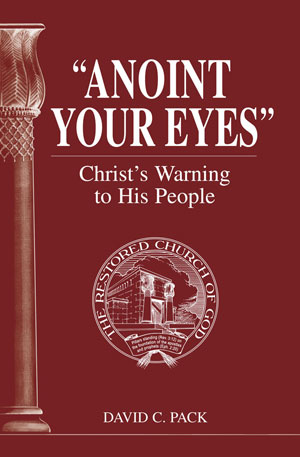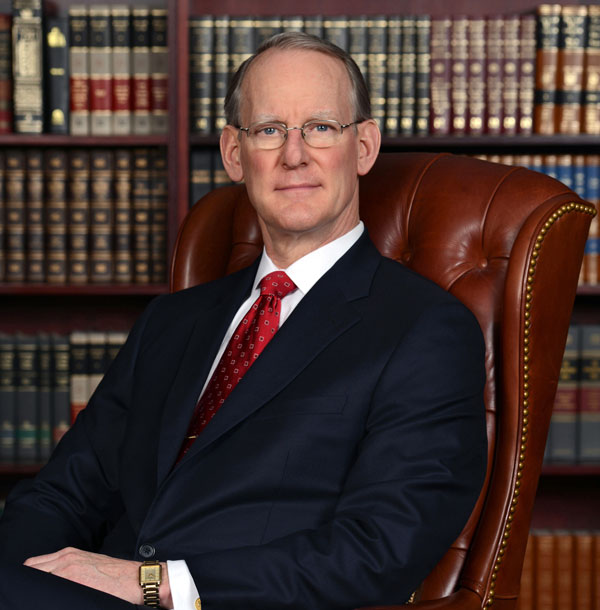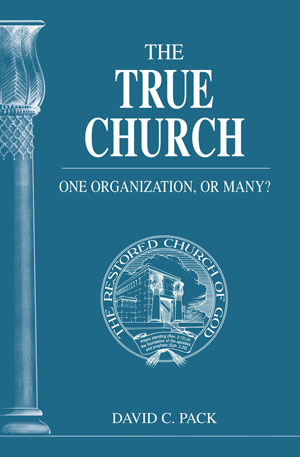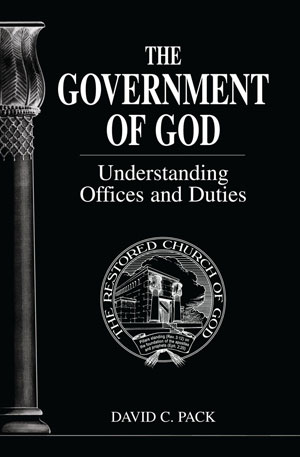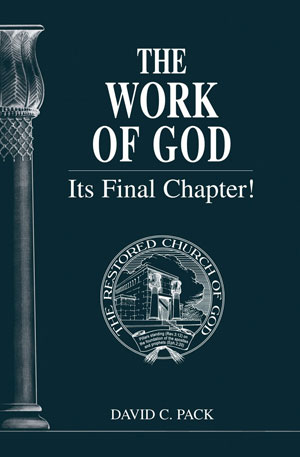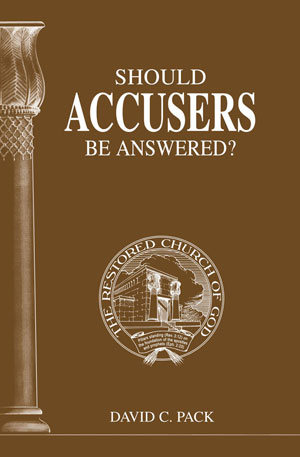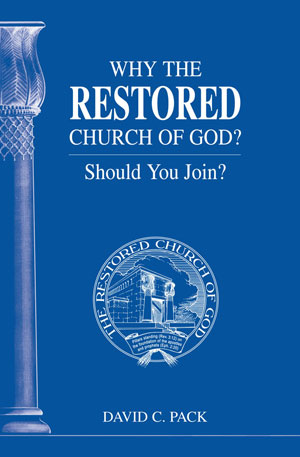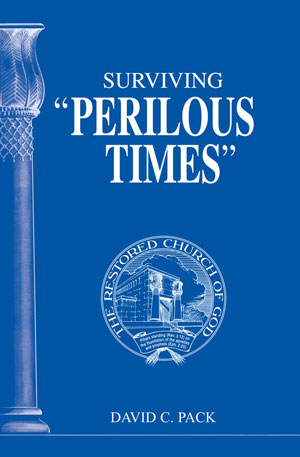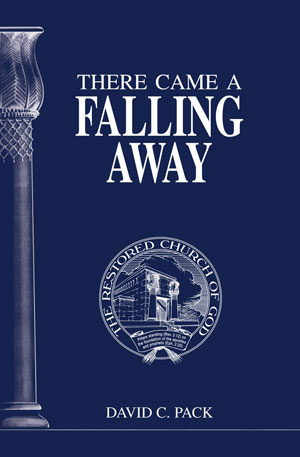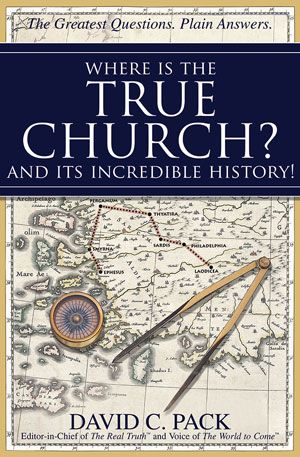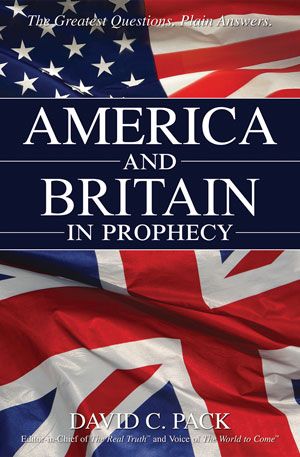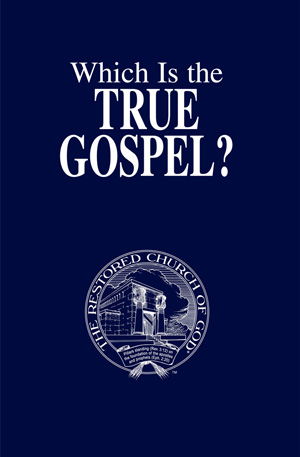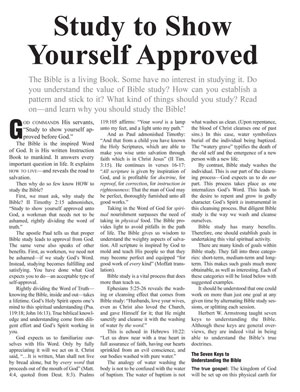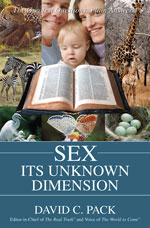The all-powerful Jesus Christ promised that His Church would never be destroyed (Matt. 16:18). He has again kept this promise. His government, the reconstruction of all of His truth in writing and the full Work of God is all back in place once again. In order to accept that this has happened, you must be convinced that God has raised up another leader to continue what started 2,000 years ago. Obviously, many of you do believe that God has or will select one more leader, but you have developed your own set of criteria for who this could—or could not—be. Hopefully, by now, many of your objections have been addressed. However, you may still have others, and they may center on me personally.
The next several sections of this chapter were difficult to write. God’s leaders are always to remain “little in their own eyes.” Mr. Armstrong understood that God had selected him for a great task—and he unabashedly identified himself as having been chosen for his office. At the same time, he remained humble. Though some now attack him on this point, very few during his lifetime accused Mr. Armstrong of having an elevated opinion of himself. Having spent many hours together, both in person and on the phone, I never perceived anything remotely close to a spirit of vanity driving his actions. Mr. Armstrong knew who he was and who he was not.
Realize that meekness—similar to humility—is not the equivalent of weakness. Moses is a wonderful example of how even the strongest of God’s servants can be “very meek, above all the men which were upon the face of the earth” (Num. 12:3). Moses and Mr. Armstrong knew God was using them, but this did not automatically make them arrogant or filled with pride. However, when God chooses a man, if he is righteous as he should be, then he had better be as “bold as a lion” (Prov. 28:1). And if he fears God, he will have and demonstrate “strong confidence” (Prov. 14:26).
I certainly want God to find me with these qualities, and it should also be reflected in a willingness to accept a decision that He has made. Of course, I could not “carry the water” of either Moses or Mr. Armstrong—and I know this! But neither can I be afraid to acknowledge what God has done, simply because people will accuse me of pride, vanity, arrogance or presumptuousness. To pull back, because I fear such accusations, would leave me open to God’s accusation that I have rebelled against His decision. That I do fear.
A New Leader Chosen
God has selected a new leader for the remnant of Philadelphia. Just as Mr. Armstrong would not apologize for God’s decision to use him, neither can I. Perhaps the biggest single reason (and I suppose there may have been several) that God selected me is because I never sought this office—never dreamed for a split second that God could have this position in mind for me. (If I am accused otherwise, that is someone else’s error.)
With all of my faults and weaknesses, only God knows why I could be useful as His tool. But this much I can say—I never once looked in the mirror, in the nearly twenty-eight previous years I had served in Christ’s ministry, and said anything akin to, “Behold, I am God’s answer!”
I never did. Prior to being fired from the Global Church of God in the spring of 1999, the fact that God had selected me for a special purpose had not occurred to me, even once. Only at that time—a few weeks before God established The Restored Church of God—did I begin to look back at my remarkable training and experience, and conclude that God had been preparing me for a very long time. And this only occurred to me because I could no longer find a senior minister or even one trained minister who was fully holding to all the truth I treasured.
When I was finally forced to look back at my years of preparation and experience, one of the things I saw was that I had been, in part, trained personally by Mr. Armstrong during the first 15 years of my ministry (after marrying his secretary in 1971). I recognized that I had been prepared to be able to continue the Work as he had done it. Also, I was familiar with how he thought in a host of ways that would be invaluable to anyone who was thrust into what I had to do. I remembered he had repeatedly said that he would “walk across the street and start over” if necessary.
This meant that I had no excuse for not being willing to do the same. While the amount of work necessary to press on was beyond comprehension, my training was in place from Mr. Armstrong, and I was only left with whether I would follow through as he would.
In addition, God had caused me to travel an extremely difficult course, as He does with all His leading servants, in preparation for the time to gather all those of God’s people—those with His Spirit—back to His Church after the apostasy. I did not appoint myself. No one else came along—and believe me, I searched for someone who was not compromising!
Of course, many will never accept God’s selection. This is true even among those who still feel that God only works through one man at a time. If they do not “anoint their eyes” first, they will not—actually cannot—look with the right criteria in mind.
Once again, consider for a moment the well-known thinking of the twelve-man, elected committee that leads UCG, having the largest total number of people who survived the falling away. Recall that their leaders have adopted democratic government, where the elected committee then votes on who should be their leader for a set “term of office.” They justify such appalling confusion—where the tail wags the dog—by stating, “God has not raised up a single man, as with Mr. Armstrong. If He did, we would follow him!”
God has selected His leader, but they do not follow. Why?
Blind Splinter Leaders
To appreciate their “churchview,” take a glance back to the final years that the leaders of this organization remained in the Worldwide Church of God. This includes the period through the spring of 1995 (many ministers who went with other groups also left at either the same time or only slightly earlier). These men compromised, appeased, politicked and played along, while at the same time being perfectly willing to sit in the presence of the false, pagan, manmade, trinitarian god for 2½ years! Facts are stubborn things. And the facts of history are that most of these men accepted this false god, and only later reassessed their position to one degree or another.
Again, having absorbed dozens of false doctrines and ideas to which they had grown accustomed, these ministers left at the last possible moment, when they saw the sheep leaving without them. They saw themselves about to permanently lose their paychecks if they did not immediately follow thousands of tithepayers out of the WCG. But, not wanting to appear to be followers—and horrified that many who were leaving were either joining or contemplating joining one of the two large, established, more doctrinally conservative splinters of the time—they quickly jumped in front of the departing flock, claiming to be their leaders.
However sincere these men may be—then or now—recognize that they have a long history of deep, profound blindness! Of course most of them will never follow me as I follow Christ (I Cor. 4:16; 11:1). Of course they will not recognize where and through whom God is working. Of course they will not give up their power, authority and influence. And of course they spin stories about me, as do so many others, to frighten as many brethren as possible into remaining frozen where they sit—because this keeps the tithes rolling in.
Many of these leaders also enjoy a relatively good relationship with the leaders of the other organizations, because the beliefs of the big splinters are much more generally similar than these leaders are willing to admit. However, because none of these leaders are willing to give up their individual seats of power, certain organizations that could otherwise probably be combined remain separate.
Those Not Prepared
Understand that I am not trying to attack these men. What is quietly taking place behind the scenes, if you really knew the facts, is precisely the opposite of this—and their attacks on me started long before any of us left the WCG. I am relating certain events so that you can understand how virtually ALL of the splinter leaders think. They all share a deep and complete blindness that prohibits their ability to see how much truth they have lost—and where the one smaller organization is that has not compromised any of it.
God carefully and thoroughly trains His servants over a long period of difficult coursework. His choice could never be one of the “golden boys”—the “beautiful people.” These are the men who generally attained high office through political dexterity and smoothness, and by rarely taking tough stands or making difficult, unpopular decisions—unless it personally advanced them.
I have known many men who are supremely gifted at “walking the halls of power” and only rarely offending any of the many constituents that they felt they must please, if they were to continue in office—and to continue advancing. Such “leaders” would automatically draw large numbers of followers simply because they are “name brands”—and because they have such smooth, comfortable personalities, good at telling people what they want to hear instead of what they need to hear. These are many of the same men who were, and still are, able to secure enough votes to be installed into the referenced twelve-man committee. I sincerely pray that you can see this. It is more true than most could ever dream.
Ask yourself: Why do so many people look for one to follow among those who played along and sat silent with little or no resistance for years while Mr. Armstrong’s successors slaughtered scores of thousands of God’s people—their brethren? Why do so many want to be led—again!—by such weak non-leaders? Why would anyone want to follow followers, let alone a second time? Yet, so many do.
But again, before God can use the man He has chosen, all of the man’s coursework, suffering, training and experience must be in place. Understand the following: Mr. Armstrong could never have picked the one God would use as his true successor. If he had, God’s purpose for the apostasy—to test which brethren in the Church loved His truth and way of life—would have been thwarted. God’s people would also never have gone on to face the second choice (or step)—and test—now upon them.
Fix this firmly into your thinking!
Mr. Armstrong’s Final List
Some have boasted that they were on Mr. Armstrong’s final “short list” to become the next Pastor General upon his death. In fact, Mr. Armstrong was considering perhaps four or five men at the time he settled on a successor.
Since a faithful man could not possibly be part of God’s thinking for that next stage of His plan, anyone bragging today that he was one of the “finalists” in late 1985 for the role of Pastor General should feel most uncomplimented by the fact that he was even under consideration. After all, he would have been under consideration by God (of course, not by Mr. Armstrong) for the specially-appointed role of throwing out the truth, ending the Work, slaughtering much of the flock, shrinking the corporate church, dispersing the assets and setting in motion the final, great spiritual test for God’s people!
Understand. God was leading Mr. Armstrong’s mind directly away from anyone who might be even a little bit faithful!
But eventually God would have to make His choice known for those waiting to return to His Church so they could potentially leave the Laodicean condition. Self-appointed, compromised, cowardly leaders—blind to the age, lacking true training for the job, and seeing God’s choice as a rival—would have to denigrate this man. Their blindness, and the general nature of how they conducted their ministry for years, prohibits them from understanding my leadership style. After all, they have proven they never understood Mr. Armstrong’s leadership style!
You must see this!
A Matter of Rebellion
Look for a moment at Samuel and Saul. There is an obvious parallel here. God had picked Samuel as judge over Israel. The people of ancient Israel wanted someone more attractive—more acceptable to the world’s standards of a leader’s profile (in Israel’s case, a king). God told Samuel that the people had not rejected him. In their request for a human king, they had rejected God’s rule over them, as Israel’s true King.
This is what is at stake today. But, as with ancient Israel, most will never see what they are doing in this light.
This matter does not come down to a personal choice or some kind of spiritual “popularity contest.” You must locate the government of God and do this by examining what men teach and the Work that they are doing.
The litmus test of who the human leader of God’s Church would be could never be defined by how many of his self-appointed rivals “speak well of him.” As a matter of fact, with both Church history and scripture as the standard, receiving very much of such praise can actually become a kind of disqualifier, revealing the man to have been a pleaser, compromiser, appeaser-type of personality. Christ said to “beware” of these.
Before taking their own “stand” in UCG, most of these ministers, including some of the other splinter leaders, attacked me from their WCG pulpits when I was fired in early 1993. (Actually, after they had privately expressed to me concerns similar to mine, years before they were willing to leave the WCG, some of the very men who turned me in went on to be the top leaders among the big splinters.) I was willing to stand completely alone at that time, as a field pastor, when they were not yet even willing to stand with a group—so they could continue to enjoy safety in large numbers in the apostate WCG—for several more years!
Finally, how many Sardis ministers spoke well of Mr. Armstrong after he left their fellowship and was forced to indict their doctrinal understanding?
Confronting the Question
If you are to return to God’s Church, and escape the Laodicean condition, you must directly confront the issue of whom Christ has chosen to finish His Work. You must confront what my accusers say about me—and process your way through why their accusations about my character could never have happened any other way.
Ask: On what basis could they understand one who loves doctrines they do not love—and in some cases cannot even remember? How could they comprehend a coursework of training, experience—and much suffering—that they never experienced? On what basis could they appreciate one who tried to make the difficult decisions they generally avoided? How could they understand one who has been persecuted for real leadership when they generally, in most but not all cases, spent decades appeasing and placating—“pastoring”—so many of what we now know were just troublesome, divisive, rebellious—unconverted—former “brethren”? (Remember again, 75 percent of the WCG were probably not converted.) The answer is because their goal was to have Headquarters and others speak well of them.
I tell you on God’s authority that this is no exaggeration! These men have long proven that they understand little or nothing of true leadership.
Misunderstanding Leadership Succession
Here is another point. You must also see through the illusion of many who believe that someone must be handed a “baton” from a successor—like Catholics believe is passed from pope to pope—for the man to be God’s choice. Though ridiculous, and not what Mr. Armstrong taught—or experienced—this thinking is surprisingly common, primarily in those who followed the first splinter leader!
False leaders seized control of the Church. They were hardly going to hand any kind of a baton to a faithful leader. The baton, as such, is given by God and held by whomever He selects—the one who is led to reach over and pick it up out of the ditch. Mr. Armstrong was not passed a baton by anyone in Sardis. (Remember, he taught that God’s government was not present in Sardis—it had not yet been re-established in the Church.) He left the fifth era because ALL of its leaders were compromising when he would not. In my case, for identical reasons, I have similarly disassociated from the splinters where so many of the seventh era still reside.
Today, the brethren of various organizations, in effect, own the ministry, though most have never recognized it as such. They actually “rule” the ministry in a certain way, because they can leave whenever they wish, if things do not go as they like—taking their tithes to another competing group! Their choices are many. Most ministers today will never be willing to reject the practice of appeasing and placating people (now that organizations are smaller, there are fewer tithes to go around). These ministers usually find themselves choosing, conveniently, to label their appeasement as “growing in love” or “being more tolerant” or “being inclusive” or “responding to their needs.”
God labels them “lukewarm” (and, in some cases, outright “enemies”).
When the Sardis era transitioned to Philadelphia, Christ had to raise up an absolutely uncompromising leader, and then begin regathering His people. Only at that point could the second step of the separation of eras occur.
Remember, people of potentially two conditions left the WCG—those with and without His Spirit. Christ must separate them from each other. So, He next raises up a leader. Then, He gathers those determined not to compromise back to a condition of unity. (Understand though. Many who return to God’s one Church may never fully leave the Laodicean condition, or will slip back into this condition upon returning to the Church. The Laodicean condition is still dominant right to the end.) As explained, the Church must be unified before flight to safety for some, and punishment in the Great Tribulation for others. Christ must keep His promise to call and work with each sheep in the decision-making process (John 10:3-5).
No “baton” passes in smooth and immediate succession, because this cannot be done instantly. It requires time. This extra time is also intended to reveal—through continuous testing—how many brethren would continue to endure, waiting for Christ to reconstitute His government, Church and Work—and how many would give up and quit. While many have thrown in the towel, deciding, “Men lied to me so I no longer have to obey God,” many others did patiently wait for the all-powerful, living Jesus Christ to keep His promise that His Church would not die out!
Unlearning Catholic Thinking
Many get confused over the fact that a number of years passed from the probable starting date (1986) of the Laodicean era—technically, it began when the majority of actual brethren had taken on Laodicea’s characteristics—and the appearance of Restored in May 1999. Again, similar to Catholic thinking regarding popes, they have come to believe that a “Philadelphian baton” must be directly handed from one man to another. The Bible simply does not say this.
The two-step separation process, because people of potentially two but still co-mingled conditions left the WCG together, requires extra time for God’s test to play out. This period serves at least two purposes. The first has to do with what the brethren must learn and the second has to do with what the new leader would have to learn: (1) God must know how many would patiently endure, learning their own lessons during this period, while waiting for Christ to keep His Matthew 16:18 promise. (2) It may require time for God to train and install His leader, allowing His Church and Work to be fully reorganized.
The Leader Learns and Is Tested
Another question arises, and it is mammoth: How could the Philadelphian leader fully understand all that the two-step process entails unless he had to endure it himself? He would have had to have been humbled by many sore trials, sufficient that he would not have sought to install (translated vault!) himself into office as so many have. He would naturally have been inclined to seek a faithful leader senior to himself. I certainly did.
Understand also that the leader whom God plans to appoint almost certainly requires extra training, and has his own lessons to learn. He may not be immediately ready for his new role. I did have to receive many kinds of additional training and endure suffering—some borne of my own foolishness—en route to extensive lesson-learning. Like Mr. Armstrong, I benefited from certain leadership positions I was given. This extra time, over the more than six years after I was fired from the WCG, forged, tempered and prepared me in other ways too numerous to recount! It also prepared me to teach the apostasy’s lessons to God’s people.
The Bible is filled with accounts of God’s servants having to undergo suffering and learn lessons. Mr. Armstrong’s extensive autobiography has many such stories, as he slowly disassociated from almost dead Sardis. For those who want to know more about my background, others of our splinter books give a little more detail. (My two-volume Biography may interest you.)
The man whom God uses does not have to begin the very first group or organization that emerges from the WCG. The first man might simply have been a self-seeking rebel looking to be “first out of the gate” to establish himself—PCG’s leader. The one who leaves first does not automatically carry a torch stating that he is God’s selection as the Philadelphian leader who will finish the Work. Also, this would abrogate the second test, which this book has described so carefully.
All the groups that formed from the WCG were Laodicean, because the Laodicean age had arrived. This did not allow for a tiny little “Philadelphian remnant” to be tucked among the splinters from the beginning, with the group magically finding each other—though many claim as much. Actually, when truly understood, because this is the Laodicean age, any group that formed directly from the WCG is automatically eliminated from being Philadelphia. This also applies to their leaders.
This is why a second step is required for those determined to follow God’s Spirit and return to His Church. No one remained Philadelphian by the Bible’s standard, and the fruits show some if not many have in fact lost God’s Spirit. All must anoint their eyes. Christ allowed for no exceptions. Read and reread this until you understand the full process!
Just as some people unknowingly took on the Protestant thinking toward the one true Church and who leads it, and must unlearn their error, others unwittingly took on the Catholic thinking toward leadership succession, and must similarly unlearn it!
Do you see this? Can you recover from having absorbed either of these positions?
What Are You Saying?
Pause and think about what you are saying if you reject my leadership as God’s selection to lead His people to hold fast to the truth and finish the Work. Since you could be rejecting the one whom God has chosen, you had better have a good reason that you are prepared to tell Him regarding why you did this. Your reasoning almost certainly has to be summarized by one of the following:
(1) You believe that supposed “Philadelphians” and Laodiceans remain co-mingled in the groups they attend until the Tribulation, with all of God’s people never having to take a stand for the truth and return to His one Church. If you choose this position, you are saying that God’s government has disappeared, and there is no longer one true Church—that you do not have to look for or return to where the full truth and true Work are. Mr. Armstrong would never endorse this thinking—and did not when faced with the same decision with Sardis.
Your only other options are: (2) “Mr. Pack is stuck in the past, because Mr. Armstrong was wrong on key points and our leaders have ‘outgrown’ him,” or (3) Mr. Armstrong was right about biblical government beginning with one man and about all of God’s people walking together in unity, but another “better” minister will arise who is willing to spend up to 20,000 hours (including my late wife’s typing) rewriting and restoring the truth into well over 6,000 pages of literature—and the seemingly endless work I have been willing to do by myself. And then another 5,000 to 10,000 hours were spent preparing the “splinter” literature. (Incidentally, just one of the other tasks I face alone is producing the over 100 video broadcasts placed on our websites for people learning the truth for the first time. Then there are calls, emails—and so much more.)
I have learned what Paul meant when he said that he would “spend and be spent” for the brethren (II Cor. 12:15)! Yet, when he had to make statements like this, he was accused of boasting by the very people who had been so willing to “suffer fools gladly” (11:16-33).
Do you think there is even time for another man, if he started now, to complete the task and still finish the Work? I ask those who believe the “another man will come later” illusion:
Where is that man NOW? Who are even candidates to fulfill this responsibility?
How many men do you think there are today, who at this point must still be hanging back in the shadows, that might suddenly appear and be willing to routinely work 80-hour weeks (and more, the later they start) to redeem the lost years?
How much more spiritually weak will God’s people be in one, two or several more years (and realize this was written in early 2003) when someone else might be willing to initiate and present them with another organization, 6,000 pages of rewritten literature and so much more?
Were this to happen, why would significant numbers follow this man then when they will not come to the light of truth now—and will not follow a similar man now? (Because he is a “name brand”?) Then, how is this man occupying himself today? After all, at some future point, he would have to explain that many more years of his inaction!
Then there is the tougher question of whether there is sufficient time for another organization to form and get established, if it happened later, after more years pass, leaving even less time for the faithful flock to be gathered and the true Work of God to be restored, let alone completed.
Think on these things! Force—force—FORCE—yourself to address them!
Do not kid yourself. There are no “mighty men” waiting in the wings. No “evangelist” is coming (only four or five in the splinters remain from Mr. Armstrong’s time, most now very elderly) to gather the faithful sheep and finish the Work, after first rewriting the full truth he has not yet (many years after the apostasy) even been willing to start to produce. Christ’s guidance is not divided. God has already raised up the only leader who, however imperfectly, was willing to wade in and take on such staggering tasks.
Although we began slowly––like Mr. Armstrong in the early time of testing during his Oregon years––what is happening now at our headquarters can only be described as phenomenal. We are continually hiring more staff and have plans in place that almost boggle the mind, when one considers our current size. The only area in which we lack is that we are not wealthy––not “rich and increased with goods”—like the large splinters. These groups all sit on enormous budgets, yet accomplish relatively little because they lack the zeal, efficiency and unity of purpose that we enjoy. To witness our staff at work for just one day would bring back memories of the 1950s and 1960s!
The fruit of Christ in this Work is most apparent!
Another Apostle
By now, the reader understands what has been explained to be my office, that of apostle. It is not the purpose of this volume to cover this in detail, but at least a very brief explanation should be presented here for how to know if this is true—for how to know when this office has been given.
Mr. Armstrong explained that there is only one way to know if Christ has given a man—any man—the office of apostle. That is by the fruits. Here is what he wrote in 1955:
“Until the past very few years there was no real evidence that God had set anyone in the office of apostle in His Church today. Men cannot elect or place in office an apostle. And the only way men can know when God has set one in that office is by the fruits.”
“Six More Ministers Now Ordained,” GN, Feb/Mar 1955
Of course, there came a point when Christ revealed—and it was by the fruits—that He had given me the office of apostle. This is explained in very careful detail in the sermon series “21st-Century Apostle,” part of the Splinter Explanation Packet. (Realize the series was delivered in the beginning of 2005, or what has now become an early vantage point.) The reader will want to thoroughly examine whether I have been given this office or have taken it to myself! The sermon series “Watchman to Israel—Messenger to Laodicea” offers more insight. You are encouraged to “prove all things” in this matter (I Thes. 5:21).
Here is one additional statement from the same article from Mr. Armstrong that was presented to me—and the one that revealed what I had to do. Mr. Armstrong was explaining how he came to know, in late 1952, that he held the office of apostle:
“But in the light of events, the fact of how God has set up His Church today has become self-evident to all. It is god’s doing. If one does find, unexpectedly, that God has set him in such an office, there is only one choice—he must accept it with full humility, realizing personal lack, and surrendering the self totally to god as an instrument in his hands, relying wholly upon God for guidance and every power and need.”
I have done what Mr. Armstrong explained, and done so being well aware that detractors, accusers and others will eagerly attack what Christ has done. All of that is beyond my control. But acknowledging God’s decision is within my control, and no man can refuse such an appointment!
Here is one more statement that was quoted earlier in the book. It explains the meaning of the word apostle, and what this office means to the Church:
“The word apostle means ‘one sent forth.’
“The New Testament Church of God received all its teachings, practices, customs, from the apostles, with Peter chief over all the others.
“Yet the apostles were the teachers, who instilled in the Church the beliefs, teachings, practices and customs of the Church. And all members of the Church were required by God to believe and speak the same thing!
“there was no doctrinal board! The teachings of the Church did not come from a council of ministers and/or lay members, who voted on what to believe.
“Right here, mark well this point: god put his truth into his church through christ and through the apostles!
“note this! The Church of God is built on the foundation of the apostles and the prophets…
“I have shown you…that Peter was leader of the apostles—and that the Church received its teachings and doctrines from the apostles!
“So now let it be made official—by Christ’s present-day apostle—that this binding and loosing plainly, clearly was given to Christ’s chief apostle—not to lower-rank ministers ordained by his authority—not by the church as a body—but by the apostle!
“Jesus Christ is the living head of this Church! he built it through His apostle. And He, christ, still rules supreme in the one and only area on earth where the government of god is being administered today!”
“How Christ Gives the Church its Beliefs,”
GN, Nov. 20, 1978
The last paragraph of the above statement summarizes how God’s government works in His Church. It becomes a picture of how The Restored Church of God functions. As has been explained earlier in reference to Mr. Armstrong, and it is deeply humbling to say this, God’s people are left to decide whether they will receive or reject “one sent forth” from Jesus Christ to His Church!
There are no other choices.
Referenced earlier, The Government of God – Understanding Offices and Duties covers all of the offices (ranks) and responsibilities of the New Testament ministry in much more detail than can be covered here. The picture from Mr. Armstrong’s quote is thoroughly filled in by that book.
“Anywhere But Restored”
Recall for a moment how, when we were first called into the WCG, many of our relatives said, “Go to any other church, but just don’t go with that Armstrong church.” This may have happened to you. History is repeating itself, with many in the splinters saying, “Go with any group—but don’t go with ‘that Pack church.’ Haven’t you heard about The Restored Church of God [this also usually with me in mind]?”
God is gathering His people, including all He will protect, into The Restored Church of God. We are the people of zeal and brotherly love—those holding fast in the face of enormous persecution. We have been and are bearing the heat of the day now. This is not true because I say so—it is true because the facts of history and prophecy bear it out.
So does our fruit.
There is no one else. Every one of Mr. Armstrong’s top “lieutenants” have sold out or compromised and gone to sleep. Many others have died. Their behavior has been cowardly and absolutely shameful. Those I considered great servants of God now shake like leaves in the wind. May God have more mercy on them than they have had on His flock!
You must ascertain where God’s leader is—meaning where God Himself is working. He has reconstituted His government—again. If you do not come, having a concern about government—or anything else—as the excuse, you do not love the truth you pretend to love. If you did, you would run barefoot, over broken glass, through fire, to jump deadly snakes and swim through alligators to get to it!
At this point, a previous quote from Mr. Armstrong needs to be repeated for its reapplication to you. As you read it a second time, keep yourself in mind, asking how strongly you are persuaded that you do not have to find and yield to wherever is the one place on Earth that God has once again restored His government, also under “one sent”:
“But when I was challenged, before I learned about the Holy Days or anything, I was challenged on the point of God’s law and of God’s government! The whole thing was government. The thing that Satan took away was government. The thing that Christ is coming to restore is government. And what He raised me up for was to restore government in His Church! And the whole test of the challenge in the first place after God had softened me by other things that will be recorded in this book [MOA] was the point of government.”
Rely on God, April 6, 1985, Sermon
Government in Restored
Notice that the above statement came from a sermon titled “Rely on God.” It certainly does require real faith to believe that God works from the top down. Betrayed people—those whose trust has been violated one or more times—do not easily trust again! All of God’s people once knew that the devil is the author of doubt about everything that is of God. Comprehend again this reality. The greatest aspect of Satan’s assault on the Church was his nearly universal success in destroying the trust that brethren all once had in God’s ability to lead them through His chosen leader and headquarters. Where faith was once strong and also nearly universal, doubt has entered—and become nearly as widespread.
I heard one man state, “I’m not going to follow a Napoleon on a white horse.” I understand his mistrust. He had been badly burned, several times, but this cannot be used as an excuse to reject proper authority—to carelessly dismiss the restoration of God’s benevolent government over His people.
As explained, many believe the apostasy was spawned by the system of government that Mr. Armstrong taught, rather than by the men who infiltrated it. They think it was a false system that permitted false leaders to capture the Church—or corporation. This is ridiculous logic, causing people to exchange a good system with bad leaders for a bad system with blind leaders. Which is worse?
Winston Churchill once declared, “Democracy is the worst form of government, except for all the others” (referring to dictatorships and monarchies, etc.). Of course, this is not true, if God’s Spirit is present and directly guiding in that hierarchical government! Christians never copy the Protestants, recognizing democracy leaves God out of the picture—and that it never worked effectively in Sardis.
Jesus said, “For the children of this world are in their generation wiser than the children of light” (Luke 16:8). Even in “this world,” no successful corporation of any size is run by a committee. Mr. Armstrong despised committees. In the Church, councils and boards holding final authority are just nice words for committees!
How It Works
Understand! The main reason that elected government does not work in the Church is that God cannot, and will never, lead a system of Church leadership and governance other than HIS OWN! This would be tantamount to changing the gospel, which, at its core, is a message about hierarchical government led by God. The gospel is about God’s government—how He will rule earth through the right form of government! People who do not understand this cannot enjoy the blessings and benefits of properly practicing it.
God’s form of government has always been from the top down. No church, leader or committee can change His system, and then, by simple assertion, declare that God is working through him or them!
Make no mistake—either God rules, or the people do! It must be one or the other. It cannot be both.
The Worldwide Church of God, under Mr. Armstrong, practiced government led by one man. As an apostle, Mr. Armstrong outranked all other ministers. This office authorized him, as Christ’s chosen agent, to introduce doctrinal truth and make corrections in our teachings—and to have all final “say” in the Church, including the institution of traditions (II Thes. 2:15; 3:6).
No one of lesser rank can claim the exact same authority and, for a time after Mr. Armstrong’s death, Christ did not raise up another apostle to guide the Church in the same way. It could be said that Mr. Armstrong, because he could rule on all doctrinal matters, practiced one-man rulership—under Christ’s rule, of course. Since his death, God’s form of Church government is possibly best described as one-man leadership.
Therefore, under Christ, I choose to describe this by saying there is one leader—not ruler—in the Church today. (Yet, this leader certainly must “rule” on a host of matters.) While this leader is not authorized to change the doctrinal foundation put in place through Mr. Armstrong, he also cannot be removed by men as the human head of the spiritual Body of the Church.
But consider. Any leader, truly called, prepared and chosen of God, would always listen carefully to his counselors—and he would seek to have as many trusted wise men around him as possible. Proverbs states variously that either the multitude of counsel or counselors brings “joy” (12:20), “wisdom” (12:15; 19:20), “safety” (11:14; 24:6) and “purposes…are established” (15:22). Government from the top down is not synonymous with a dictatorship. (THE GOVERNMENT OF GOD book has a chapter about the function of the Advisory Council of Elders.)
This said, when Mr. Armstrong was alive, as required by law, there was a corporate board (separate from the Advisory Council of Elders, which of course The Restored Church of God also has), which technically could have removed him from his office in the corporation—but all of us would have considered this spiritual rebellion had this happened. However remote, this could, because of the way man’s corporate laws are structured, still happen again. But no committee, council or board can remove a man from the spiritual office into which CHRIST installed him! If men maneuvered to remove this man from the corporation, he would still be the human leader of God’s Church.
As mentioned, our website, and the above book, carry various sermons explaining God’s form of government. They show that God has always worked through servants HE selects, not those whom people choose or elect.
The Church Is Our Mother
The plain teaching of the Bible is that the true Church is the spiritual mother to God’s people. Four verses, when placed together, confirm this. The first two are enough to prove it, but the third drives the nail home. As mentioned, the leaders of UCG and the leader of LCG no longer believe, and therefore no longer understand, this most rudimentary doctrine. And I could not convince the latter to reconsider his position. Yet, so many important elements of God’s Plan flow from this knowledge.
First notice Galatians 4:26: “But Jerusalem which is above is free, which is the mother of us all.” While this scripture states that God’s people have a Mother, it does not explain what “Jerusalem…above” means. Now notice how Hebrews 12:22-23 makes this plain:
“But you are come unto mount Sion, and unto the city of the living God, the heavenly Jerusalem, and to an innumerable company of angels, to the general assembly and church of the firstborn, which are written in heaven, and to God the Judge of all, and to the spirits of just men made perfect.”
“Jerusalem above” is obviously “heavenly Jerusalem,” identified as the “general assembly and church of the firstborn.” The majority of God’s Church is represented by this heavenly Jerusalem figure, housing, as it were, the spirits (the spirits in men – I Cor. 2:11) of all those true Christians who have ever lived—all those past faithful of every period who have been in God’s Church (I Thes. 5:23).
Next, Revelation 12:1, describing a woman in heaven, long understood to be the true Church, connects these two passages: “And there appeared a great wonder in heaven; a woman clothed with the sun, and the moon under her feet, and upon her head a crown of twelve stars.” The twelve stars are the twelve tribes of ancient Israel, a key to identifying the 144,000.
Initially, the woman of Revelation 12 who gives birth to Christ in verse 4 was the Old Testament “Church in the wilderness”—physical Israel (Acts 7:38). By verse 6, it is apparent that this same woman is now depicting New Testament spiritual Israel—the Church. The Church of God has long known this!
In one other passage, II John 5, the same apostle John who recorded Revelation references a “lady.” The context reveals this lady to be the true Church, and further confirms the truth of this central doctrine.
As with the human family, only the true mother of her children is authorized to feed and rear her children. Of course, in a world cut off from God, counterfeits, kidnappers, substitutes and surrogates often take the place of what the true mother was ordained by God to fulfill. In the same way, only the true Mother—the one true Church—is authorized by God to feed His faithful flock!
Does this help you understand another big reason you should be very careful not to assign to anyone but your true Mother the task of feeding you? Inspired and empowered of God, she is the one most concerned about you receiving a proper diet.
Get this doctrine straight. And understand why it should not be surprising that, in today’s Laodicean environment, some are also losing sight of such an important biblical teaching—and pattern!
Feeding Her Children
The Restored Church of God understands this vital doctrine, making plain the true Church’s responsibility to “feed the flock of God” (I Pet. 5:2). Pastoring over 10,000 sheep cemented this firmly—and permanently—in my mind.
The apostle Peter recorded this passage—the same Peter who had to learn in a painful exchange with Jesus how important it was to Him that His ministers “feed My sheep” (John 21:15-17). After three repetitious questions by Jesus, Peter got the point. The living Jesus Christ directly connects the ministry’s love for Him (Jesus) to whether or not it will properly feed His flock—“If you love Me, feed My sheep.”
The Restored Church of God is absolutely committed to this responsibility. And we have prepared a staggering amount of “food,” more than at any time in Church history, for God’s people. Brethren here literally struggle to keep up with all that is available to them.
Let me paint a picture of why I say this.
Each week, we send sermons and Announcement Bulletins, with occasional Bible studies, to every congregation or scattered member in the world. All who are hosts and all who cannot meet with others receive a very detailed Host Information Manual, answering questions about local Church administration. This permits the Church to function “decently and in order.”
We have reached our final total of what turned out to be something over 100 books and booklets. In addition, we have scores of reprint articles, with more appearing continually, 750 form letters—this on top of about 250 more that serve mostly new people from the world, but, in many cases, the internal needs of the Church (jury duty, immunization, anointing, Sabbath observance, etc.). A 30-lesson Bible study course is also in place.
Several hundred sermons are also readily available for our members. Our website carries all of this in a truly vast—and constantly growing—Member Services section. (Incidentally, we are also currently serving people in 12 languages—Afrikaans, German, English, Spanish, French, Italian, Swahili, Dutch, Polish, Serbian, Finnish, and Tahitian.)
In addition, besides The Real Truth magazine (32 pages in full color), which is similar to the original Plain Truth and produced bi-monthly, we have another bi-monthly, four-color magazine called The Pillar, which is provided for all members of the Church.
We also have a beautiful, bi-monthly, four-color youth magazine, Ambassador Youth, in addition to rewritten versions of all seven levels (twelve lessons) of the original YES Lessons (now called the Children’s Bible Lessons), automatically sent to all of the Church’s youth. With seven volumes of The Story of the Bible completed, we have finished this series. We also produce spring and fall Feast Activity Books for all our small children. The Church that embodies the Elijah fulfillment—foretold to “turn the hearts of the fathers to the children” and vice-versa—must never forget this responsibility is ongoing.
On the Day of Pentecost in A.D. 31, when the New Testament Church began with 3,000 baptisms, Peter declared just before they took place, “For the promise is unto you, and to your children, and to all that are afar off, even as many as the Lord our God shall call” (Acts 2:39). From the very beginning, Christ’s Church has had an ongoing God-ordained responsibility to never forget that His promise is also “to our children”—that they also can “save themselves from this untoward generation” (vs. 40).
Restored is meeting this responsibility in a big way!
In addition to annual conferences held at Headquarters, for our growing number of ministers and deacons, we have an extensive and growing Leadership Development Program (LDP) in place for others who might grow into leadership roles.
But Ambassador Center (our college) plays the most central role in preparing ministers and other leaders. Restored also has almost two dozen Feast sites around the world and provides for those scattered few who are too far from any of our sites.
All of what is described here is being achieved from our world Headquarters complex in Wadsworth, Ohio (outside Akron and Cleveland), and is done by a staff of over 70 people, with more soon to follow. This entire staff, without previous Ambassador College experience or full-time background in the Work, has been trained to handle requests for literature or sermons with a one-day-turn-around time and to do a host of other things that a worldwide organization requires.
Again, The Restored Church of God is determined to feed the flock of God so well with so much that the sheep can, figuratively speaking, “barely walk.” Each member decides how much he or she wishes to “consume.”
God’s Church is fully in place, fulfilling all obligations and responsibilities—first and second commissions—commanded in the Bible!
No One Else!
Once again, no other organization or leader will come. It simply will not happen. God and Christ are not divided! While other illegitimate “mothers” will certainly appear, attempting to claim God’s children, God would never raise up one Church, under one leader, with a plan to later replace it with another larger but identical organization, led by a more “attractive” man. Human children do not have two biological mothers, and God’s children cannot have two or more true spiritual Mothers. God is not the author of confusion, and this would be supreme confusion for brethren trying to figure out what God intended them to do. God is fully able to make up His mind about how and where to reconstitute His Church and Work well in advance of carrying out His Plan.
But let’s play “just suppose.” If God were to “change horses in mid-stream,” imagine what the people in the first smaller group—who had borne the heat of the day in such a massive “labor of love” (Heb. 6:10) to rewrite God’s truth would—think when they learned they were supposed to just “hand over” everything they had done to the new “attractive” leader and brethren following him who had not been willing to take a stand, let alone assist, earlier. The very idea is ludicrous and is something God would never do.
Yet, many now wait for this exact thing to happen!
Jesus Christ is gathering His flock here, in The Restored Church of God. This is not true because I say it. It is true because the facts state this—if you just at least have eyes to see this much. The sheer vastness of what we have in place to feed the flock is further evidence of God’s decision—to all who will anoint their eyes and LOOK!
An Appeal to Leaders
It is important to offer an inset here. As we have seen earlier, Mr. Armstrong spoke constantly of organization and structure within the Church. This is absolutely necessary in order to stabilize and feed the flock, and to baptize those new people whom God is calling. A word to all elders and deacons who could yet help lead and stabilize God’s flock before the age ends: Will you intend to take a stand with all this understanding, but never do it? Will you qualify or disqualify yourself as a leader at the end of the age? History—and God!—will record which leaders shrank into little men and failed to fulfill their role, and destiny—and which stepped forward and accepted their true burden of responsibility.
I will be blunt: God’s flock in Restored could use your help—IF you are also willing to anoint your eyes and be truly faithful!
When the age of Philadelphia began, Mr. Armstrong and only one faithful local elder from Sardis (Basil Wolverton) were all who cared about doctrinal precision. The Laodicean era should be expected to be similar. A few faithful pastors, elders and deacons, from different organizations, having purged acquired wrong thinking from their minds, are joining us. We truly welcome such faithful and humble men and their families. We are honored to have those who will zealously assist us in our supremely important task!
The Role of Local Church Elders
On a related note, with the development of the apostasy, there has arisen a variety of local church elders who now lead their own groups. This is a clear and egregious violation of the government of God as practiced under Mr. Armstrong. When correctly understood, this becomes an additional reason, once you have done your research to find God’s government, that you, as a local church elder, need to come under the authority of the senior minister who leads it.
Local church elders and local elders were never considered full ministers in the WCG. Many forgot or never knew this. Yet, hundreds of ordination certificates testify to the fact that Mr. Armstrong did not consider these men to be ministers, but rather local church elders. He only considered preaching elders and above to be full ministers. Any who doubt this should ask any elder or minister to show his original WCG certificate(s). The wording and authority are plain! I have my first two certificates, both signed by Mr. Armstrong, stating the clear difference.
Let’s say this in another way: All ministers are elders, but not vice-versa. Mr. Armstrong did not authorize local church elders to either approve or perform ordinations. Neither could any office below apostle give final approval for ordination to any rank (explained momentarily). This was recognized policy for decades and integral to the Church’s understanding and practice of God’s government. However, while most or all ordained men should have known this, most brethren probably never did.
Because local elders or local church elders are not empowered to either train or ordain a ministry to care for the flock, recognize that Christ could never lead His Church through one! Yet, several claim to lead the one true Church. They are terribly deceived men! I know because I have dealt with a number of them. These men reject the very government of God they often claim to most perfectly uphold. (Regardless of what his feelings may tell him, any man who has been ordained by another local [or local church] elder is not—under any circumstances—a valid elder in God’s sight!) Not even evangelists carry this authority, unless delegated by an apostle to do so.
Mr. Armstrong approved all ordinations, and explained this to the Church. Here is what he said as early as the mid-1950s:
“Christ is the living head of the Church!
“He sets the apostle in office. But we do find historic example in the New Testament of the apostle setting in office evangelists, pastors and teachers, and even delegating to the evangelists the responsibility of ordaining pastors and other elders, and deacons.”
“Six More Ministers Now Ordained,” GN, Feb/Mar 1955
Confused Men
There is an irony about certain local church elders of whom I am aware. Again, they claim to most properly uphold the understanding of God’s government—that it only exists in their tiny little “true Church.” They may be sincere, but they are sincerely wrong!
Why? That they are trying to lead the Church—any church—as local church elders, demonstrates that they have lost the most basic understanding of how God’s government guides His Church. Consider. Of necessity, these men must work alone—or, without God’s authority, ordain others to help them. The same is true of pastors and others.
Once again, such ordinations performed by these men are actually invalid! Christ’s true ministers would always be given their offices by Him through His unified government from inside His one Body.
In addition, understand that these men could not be authorized by God to continue His Work of taking the gospel to the world or the Ezekiel warning to the modern nations of Israel by themselves. Grasp this fundamental point. Their function was so obviously always intended to be “LOCAL.” In MYSTERY OF THE AGES, Mr. Armstrong even described pastors (Preaching Elder or Pastor rank) as functioning “locally” or as “stationary” when preaching the kingdom of God. Besides this, local elders have not been trained to either do the Work or pastor God’s overall flock!
If these are your circumstances, you cannot effectively—and bear no authority to—serve God’s flock alone. And we welcome all those truly faithful elders who recognize what this means. (All of this and much more is very carefully explained in The Government of God – Understanding Offices and Duties.)
God’s True Work Ends Only at the Tribulation
Mr. Armstrong never wavered from his belief that the true Work of God would be done until the Tribulation—and that God’s servants would never waver in continuing it. Mr. Armstrong knew that only this event would bring the “night” that Jesus spoke of “when no man can work” (John 9:4). While many believe the Work essentially ended with his death, Mr. Armstrong understood otherwise—and said so repeatedly! Although I address this subject in far greater detail in The Work of God – Its Final Chapter!, and quote Mr. Armstrong extensively there, here are a very few of his statements, spanning a 32-year period, showing that the true Work of God is far from over.
Read most carefully:
“I am now in my 94th year. God may grant that I continue in this very limited manner to direct the work for some time, but the occasional heart pains that I have endured have made me feel the necessity of letting our coworkers know of the condition as it is.
“Remember, this is the work of the living Creator God.
“I thank God that He has organized this present work of his so thoroughly that regardless of the outcome of my present illness, the work will continue right on to the Second Coming of Jesus Christ…Christ is the Living Head of this work, and He will continue guiding those He has chosen right up to his Second Coming, which grows daily nearer at hand.”
Brethren Letter, Dec. 23, 1985
“This is my first letter to you in 1986, and could very well be my last. It may be that the Work God has given me to do is complete, but not the Work of God’s Church, which will be faithfully doing God’s Work till Christ, the True Head of this Church, returns.
“Remember, brethren, this is not the work of Herbert W. Armstrong…or any man. It is the Work of the Living Creator, God…The greatest work lies yet ahead.”
Last Co-worker Letter, Jan. 10, 1986
“Brethren, if we are to continue to grow—and to grow spiritually as well as in numbers—we must remember that the purpose of the Church is, first, to go into all the world and preach Christ’s gospel. The first commission to the Church is just that. Anyone who looks on that Great commission of Christ as ‘Armstrong’s private work’ is just not a member of god’s Church. Anyone who does not have his whole heart in that work is not a member of god’s true church, and has no right whatsoever to attend or fellowship in any of its local congregations.”
“Why Local Assemblies?”, GN, March 1954
“We CANNOT AFFORD TO BECOME LUKEWARM! We cannot afford to let our minds drift from the intense NEED for this very special mission of this particular time in world history, so shortly before Christ’s coming and HIS KINGDOM!
“Now about the Work itself.
“Few understand just what IS the Church. There are so many churches in the world. People just take churches for granted. But more than 1,953 years ago, Jesus Christ said, ‘I will build My Church.’ Few know WHY He built it—for what PURPOSE. The purpose, primarily, was dual:
1) to proclaim to the world the Gospel Message God sent to mankind by Jesus as God’s Messenger (Mal. 3:1) of the coming Kingdom of God,
2) to call and prepare a chosen people…
“I have NEVER SAID I expect to live until Christ comes.”
Co-worker Letter, March 19, 1981
“Brethren, this world is being destroyed for lack of knowledge of and from GOD, as we read in Hosea 4:6. Through my personal visits, and the PLAIN TRUTH magazine, on TV and radio and through other literature, we are proclaiming that knowledge in POWER and AUTHORITY. Some listen. It is God’s last witness against those who do not. BUT WE MUST DRIVE RIGHT ON UNTIL CHRIST COMES!”
Co-worker Letter, Nov. 18, 1984
“Brethren, time is running out on us. When this great European power emerges, our great Work will be just about over. The day shall have arrived when ‘no man can work,’ as Jesus said (John 9:4).
“NOTHING ELSE MATTERS NOW. We must sacrifice and devote our all that is reasonably possible to GOD’S WORK in these closing days.”
Co-worker Letter, July 16, 1982
The Work Continues Today
I have repeatedly referenced the importance of the Church today continuing God’s only Work. However, Jesus also commanded the apostles to make disciples of all nations and to “teach them to observe all things whatsoever I have commanded you” (Matt. 28:19-20).
This passage is the central reason why any “Work” that an organization does today is not authorized and blessed by God unless it is teaching “all things” that Jesus taught the apostles. These hundreds of doctrines set the standard for what Jesus referred to in Matthew 28—which carries over to the Matthew 24:14 Great Commission that God’s Church is to finish prior to the Tribulation!
The true Work of God will be found teaching “all things” restored to the Church!
Already mentioned, we have over 100 of The World to Come video broadcasts now in place. I have already described the return of The Plain Truth magazine, now known as The Real Truth.
The Worldwide Church of God never had more than about 65 to 70 books and booklets in place at one time. Again, we have over 100, covering all of what was covered in the past, with many others covering prophetic topics and other subjects that have grown greater in importance now that we have reached the twenty-first century. We probably already have many more reprint articles, also written to those learning the truth for the first time, than were ever available at any one time in the past. (Our worldwide The Real Truth Newsstand Distribution Program [NDP] reflects the zeal of our brethren in a way that is not common in the other groups I am familiar with.)
Evidence Obvious
Another reason that I can say we have more written material in place for God’s Church has to do with books such as this one. It is one of ten, totaling over 2,000 pages, which the Church’s previous circumstances obviously did not require to be written. Someone had to be willing to take on this extra challenge. It should be its own enormous statement to you that one man was willing to do what all of the splinter leaders put together did not even begin to do—or even see the need to do! I hope you will not be dismissive of statements that can too easily be labeled “bragging” or “horn-tooting,” when they were said from a shepherd’s heart trying to help people because no one else would do it! (Being selected to fulfill Revelation 3:14 left me with the God-ordained duty to prepare this material.)
In relation to the previous section, this material is a further testimony to how committed—how convicted—our staff is to never forgetting the ongoing responsibility to feed God’s flock, inside and outside The Restored Church of God!
Some have said, “When a lot more people go there and they are bigger, then I will go, too.” Consider what such people are really saying: “When I see a lot more people with more faith, more strength, more commitment, more zeal and more love of the truth than I have go there first, I will go too!” Of course, in the end, few, if any, of these will ever come.
Still, some others may want to see us on radio and television before they will come. How silly! Of course television is happening.
Forgetting that Christ did not command His disciples to make “subscribers of all nations,” still others were upset because we were originally unable to afford sending hardcopies of our rewritten literature and magazines (designed for those learning the truth for the first time) to people in the splinters who will not take a stand for the full truth they already know. Besides, everything we produce is instantly available on our websites free of charge. (I explain much more about our hardcopy policy, and why it has been able to continue to evolve, in Chapter Fifteen within THE WORK OF GOD.)
There are many others whose thinking regarding the Work is completely backwards. While they are not willing to hold fast to true doctrine, they are strangely inflexible in their insistence upon previous methods of doing the Work. Rather, end-time Christians are told to hold fast to doctrine and tradition at the same time that they should be willing to adapt, with the extraordinary advancements in technology, to the most effective methods of doing the Work. The goal of the Work should always be finding the very best ways to reach more people—and more quickly. Also, efficiency and cost-effectiveness are vital for the group that is small. How many of us would have learned the truth if Mr. Armstrong had felt bound by the methods of the first-century apostles? Then certainly we are not bound to the methods he used in the twentieth century.
I recognize that various “works” are being done by the four or five biggest splinters. Obviously, with many who have God’s Spirit still present in these groups, there will remain an interest in putting forth some kind of paltry effort.
This said, you may be in a small splinter that is not taking either the gospel to the world or the special warning message to the nations of modern Israel. If so, you are growing cooler beyond the lukewarm stage—and you are slowly falling away completely! Your feelings may tell you otherwise, that you think yourself “doctrinally sound” and “holding fast,” but they are wrong. You are not holding fast. Wake up to your position—and at least join a large splinter where some kind of “work” is occurring until you figure out where you should be! Recognize that, no matter your other beliefs, your condition is actually worse than those in the organizations who are at least attempting a little effort with some of the truth!
Remember, based on what Mr. Armstrong taught, little groups not taking the gospel to the world are not even considered God’s people.
On a side note, some have asked what it means that PCG, led by the man claiming numerous offices of God and Christ, has come to hold the literature of Mr. Armstrong. Apparently, according to his announcement to this effect, its leader planned to at least somewhat alter it, and has already, and use it as a steppingstone to furthering the outrageous, ludicrous “prophetic” junk he claims to be “new revelations” from God. He has already deleted part of MYSTERY OF THE AGES to permit himself to hold the office of prophet, and as an administrative office, which are both directly contrary to what Mr. Armstrong wrote in the section that this man deleted.
Since most recognize that his “revelations” come from the “god of this world,” it must be understood that Satan has merely handed Mr. Armstrong’s literature from one of his organizations to another. (I do not speak of true brethren there who must and will yet flee from him to save their crown.) Recognize that as this literature is altered, and now associated with a leader who has forsaken the true God, Satan has it exactly where he wants it. He knows that he can do much more damage with it if a false prophet/false christ uses it, than if it remained largely hidden in the WCG “copyright closet.”
The apostates were shrewd to sell it to an organization that will so discredit it.
Tithes Belong to God
This is an additional reason God’s people must be careful to discern where God’s true government is at work. Tithes and offerings belong to God, to where He is working—where His Work is being continued—where the Mother is feeding her children. This is where the full truth, the true gospel and the Ezekiel warning are being preached. That describes this Church and the Work being done here!
Think very carefully about what you are doing, and how you will answer Almighty God when He asks why you decided to affiliate where you did, and why you sent His tithes to support what He was not directing.
Mr. Armstrong often reminded the Church that God will hold individuals accountable if they give what belongs to Him to those who do not represent Him!
Mr. Armstrong also repeatedly said that God’s people were called in this age to do the Work. While many now sneer at his view of this priority, it has remained true. This is something else that you must see about your personal responsibility in this age. The more faithful brethren who come with us, the bigger the Work that can be done before “the night comes when no man can work” (John 9:4).
When Zeal Is Lacking—Accusation
I have explained that we have rewritten thousands of pages of literature revealing God’s truth to those He is still calling in this age. This brings to mind a fascinating twist to the reasoning of some that must be explained at this point, because some people believe—LCG advocates loudly assert this—that doing the Work first, before the literature was in place to teach new people, reflects a greater zeal than what Restored has done.
Rewriting all the literature of the past—and more—in about 4½ years, was the most staggering and difficult task one could ever undertake—times ten! I have never been involved in anything so arduous, challenging and continuously exhausting. Other organizations understand this, but are too selfish and lazy to undertake it—even if they were to divide the work among several writers. In addition, having abandoned many truths the Church once taught, these groups see no need to rewrite it. (After all, they are blind.) How wonderfully convenient “doing the Work first” becomes. In the name of “zeal for the Work,” many successfully hide their selfish slothfulness—and the false doctrines they hope others will not notice!
Some of these very people then have had the gall to slander us as being “lukewarm” in our approach to primarily doing the Work after we first rewrote the literature and got our staff and structure in place. Of course, this is a cross we have to bear. But then those with such character should be expected to attack others who are willing to do what they are too weak and lazy to do. Their inaction also leaves them with much time to assess and critique all others. Instead, they should be deeply ashamed and repent of practicing slothfulness, selfishness, heresy, accusation, division and deceit, evident in carefully crafted statements designed to misrepresent The Restored Church of God.
God will “reward them according to their works” (II Tim. 4:14).
There is one final irony to this deceit. While some crow about their willingness to do the Work, they originally asserted that Restored does not or will not do it at all. Sadly, some still believe them, and have not investigated this for themselves. We certainly were not willing to subordinate the all-important full truth to doing the Work without any literature! The many reasons behind the decision to rewrite the literature first is explained in detail in the chapter titled The RCG Strategic Plan within THE WORK OF GOD book. Once again, as critically important as fulfilling Matthew 24:14 and 28:19-20 is, it was less important than first re-establishing the complete truth—to be made available to the world and the Church. (We have been giving out tens of thousands of items per day to both for a long time.)
Some may think, and even hope, that this matter cannot be understood so simply—but it can!
Though we have never been in a “race” with the various splinters, recognize that Restored is so far ahead in production—and size of work!—that others could never catch us, even if they had the will to try, and they do not. Whatever my weaknesses are—and I certainly have some—fear to fulfill Ezekiel 33:1-9, Isaiah 58:1 and Matthew 24:14, and unwillingness to work unending hours, are not among them. Nothing––NOTHING!––is going to stop The Restored Church of God from finishing the Work of God as the only true successor of the “Moses” ministry completed by Jesus Christ through Herbert W. Armstrong!
I am determined to run through fire barefoot over broken glass and jump deadly snakes, if that is what is needed, to finish the Work and fight for ALL of the doctrines of God—and for the brethren who still love them! People of sixth era thinking must exhibit a spirit of zeal—and this is found in Restored.
Having been part of God’s Work for over four and a half decades, I have never seen more zeal and enthusiasm to do it than what our staff demonstrates daily. They seem to labor with almost no concern for the clock. God’s presence is powerfully evident in the exploding energy that all seem to have been given to complete the massive Work that must be done.
I hope you will take the time to reread II Corinthians 5:7, and will not be tempted to despise “the day of small things” (Zech. 4:10) because Restored is not as “big” an organization as the largest splinters. The wonderful age of Philadelphia is over. Laodicea is permanently dominant. This said, we are, however, bigger than the Radio Church of God was in the mid-1950s, when Mr. Armstrong had been preaching for over twenty years!
Brotherly Love—and the Love of God
God says that He “is love.” Only by “being rooted and grounded in love” (Eph. 3:17) will one be able to “comprehend …what is the breadth, and length, and depth, and height” (vs. 18) of God’s Master Plan. Yet, this passage goes on to show that having love is the path to also “know[ing] the love of Christ” (vs. 19). While this may seem strange, it is not.
All those who wish to understand—to “know”—the love of God must practice it. Review Psalm 111:10, I John 5:3 and Romans 13:10. This love is intrinsic to everything that God does and that a Christian is to become. This love of God works with and is complemented by brotherly love.
All that happens in the last days to God’s people was carefully planned by the God of love (I John 4:8, 16). He intends to do absolutely everything in His power to jolt every one of His people—who all remain free moral agents—back to reality, so that they will make the right choice, with their eternal life (and future protection) on the line.
In his second epistle, Peter explained, beginning in chapter 1, verse 5, the aspects of character that one must build to ensure that he has made his “calling and election sure”—and that he “shall never fall” (vs. 10). The eight qualities listed there are vital, and could be a series of personal Bible studies for those who are serious about building them. After building faith, virtue (character), knowledge, temperance, patience and godliness, the Christian is told to add “brotherly kindness [love]” (vs. 7), before going on to build the final quality—the love of God. Verse 8 assures that those who have these things abounding in them will never be considered “unfruitful.”
It is fascinating to note that verse 9 states that anyone who does not build these things—including godly love and brotherly love, my focus here—“is BLIND, and cannot SEE afar off, and has forgotten that he was PURGED from his old sins.” Obviously, and you have seen why, this passage carries even greater meaning in our time. Notice that sight is linked here again to being purged—and blindness to having “forgotten” this.
Paul told the Hebrews to “Let brotherly love continue” (13:1). This becomes God’s instruction to His Church today—instruction to those who wish to be considered of the sixth era. Truly, as Peter wrote, many today have forgotten the importance of practicing real, vibrant, active brotherly love between one another!
How often did Mr. Armstrong stress the need to build this quality, coupled with the love of God, best described as practicing the way of “give” vs. the way of “get”?
Where those of the sixth era are found, real brotherly love will be evident in abundance. Recall that Philadelphians are known for many things (Rev. 3:7-13), but the attribute God uses to identify them—for all time—is this quality. Speaking specifically about the love of God (agape), recall again how Paul wrote that we could have “all knowledge” (and that would certainly include all doctrinal knowledge, since it is a large subtotal of all knowledge), but if we “have not love we are nothing” (I Cor. 13:1-3).
Grasp this! In theory, one could actually achieve doctrinal perfection, and yet his life could still add up to absolutely nothing! Which do you think is more important to God—love or knowledge? By now, it should be obvious that I would never de-emphasize the importance of doctrinal steadfastness as the only proper starting point for identifying the Philadelphian era! However, I do want to reiterate what Paul said it means if we do not have both brotherly and godly love for others. Without these, we are completely worthless—of no use in God’s sight!
In The Restored Church of God, we strive to ask God regularly to help us renew this greatest of all character attributes. Remember, God says that He “IS love” (I John 4:8, 16) and is the “giver of every good gift and perfect gift” (Jms. 1:17). It is evident that He is giving this love to the people in The Restored Church of God. Though not perfect, you would have to see the wonderful brotherly concern within the brethren of Restored to believe it. It is almost beyond what can be described!
Once again, over and over throughout his ministry, Mr. Armstrong stressed the importance of outgoing concern, which was his way of emphasizing love. He continually contrasted the way of “give” to the way of “get.” This outgoing concern should receive the greatest emphasis in the people known for brotherly love. This is another reason they keep their focus on continuing the only Work that will really help their fellowman!
The death of Mr. Armstrong is the point from which our beliefs—and understanding of God’s love and brotherly kindness—must spring. This is the last moment the Church was, technically speaking, “on track.” There is no denying this, or the problems that spring from ignoring it.
Leaving Wounds and Attitudes Behind
Everyone has picked up practices, beliefs and ideas, perhaps unconsciously, that now prejudice them against brethren in other groups who walked different paths after the apostasy. The fact that some do not know this does not change it!
Do not miss this fact!
Many have picked up attitudes prevalent in their particular organization. Each of us could probably write a book on why our organization was the best to have come through. We would all be wrong! Christ is gathering people from all the groups. Since the apostasy, people have walked many, sometimes very convoluted, routes to where God’s Government, Truth, College, Work and Church have been reconstituted.
Some organizations (PCG and offshoots) literally train their members to become “attack dogs,” teaching them to slander, accuse, attack, blast, and lambaste all the “evil sinners and Laodiceans,” not as “perfect as we are or the organization we are in.” This has almost become a form of “killing” (spiritual murder – I John 3:15), thinking that one is “doing God service” with such actions (John 16:2).
On the other hand—and here is the other side of the coin—we are unwilling to tolerate endless, or even any, false doctrines by overriding them, as do most of the splinters, with the Protestant emphasis of “just having love.” (Recall the LCG leader’s definition of where the Body of Christ is found.) We live in an age when Christ said His people would experience “hatred, betrayal, offense” and “lawlessness” (Matt. 24:9, 12) to such a degree that “the love of many [brethren] will grow cold.”
We are determined to actively fight this terrible trend, tragically devouring so many of God’s people!
Christians copy and imitate Jesus Christ! They, through their conduct and words—which spring from their thoughts—reflect and exude the life of Christ! We all know that Christ did not give His life for our sins so that He could turn right around and pick us apart. What would be His point? He would be countering His purpose to cleanse our sins and imperfections. It would make no sense for Him to say, “I love you and I died for you and now I’m going to pick you to pieces.” Christ never does this and neither should the people of brotherly love!
In The Restored Church of God, we are striving to leave wounds behind, recognizing that events of the last many years left many injured, and in most cases no longer able to view people, ministers or the Church in the same way most once did. In time, God will heal anyone of wounds and bruises, whether received from offenses and betrayals by ministers or brethren.
Such injuries may be keeping you from loving people as you once did. Determine to “forget those things which are behind” and to “press toward the mark…” (Phil. 3:13-14). But, to recover from your wounds, you must also first be able to recognize them—you must locate your battle scars, wounds and hurt feelings, and strive with God’s help (John 5:30; Matt. 19:26; Phil. 4:13) to overcome them—to recover fully! This is what we are trying to do in The Restored Church of God—and the fruits are evident throughout this Church.
Finally, those of brotherly love are also required by God to try to help those languishing in confusion and looking for the full truth. You may review the sermons “Known for Brotherly Love” and “Should Christians Avoid Proselytizing?”, found on our website.
Also, just referring this book to family and friends is of immeasurable importance!
Where the Burden of Proof Lies
Something most crucial must be understood at this point. I cannot overstress its importance. Contemplate it carefully!
The burden of proof that we are the one true Church and sole Body of Christ rests with neither The Restored Church of God nor me. It is not our responsibility to prove to you that God’s government is here, and here alone. This is your responsibility!
Consider. Restored teaches the full truth, precisely as we all once believed it. It is doing the same Work, exactly as the Church once did it—and this is all being done under the government of God, as the Church once understood and practiced it. All of the evidence, facts and proof necessary to know these things are abundantly clear and can be found to demonstrate that these statements are true. Our beliefs, traditions, practices and commission are identical to what Mr. Armstrong taught and did—and what the Bible teaches—and you can prove it.
The burden of disproof also rests with you. It is up to you to decide whether Mr. Armstrong was wrong about the doctrines he taught. You must decide if he was correct when he taught that the government of God had been restored to the Philadelphian era, which understood that God was only actively leading, and working through, one organization at a time—the Worldwide Church of God, when Mr. Armstrong was alive.
We know and have proven who we are. We know what we believe and by whom we were taught it. We hold no illusions about the Work still before us. If you are unsure of these things, then you must set out to resolve what is still unclear in your mind about where you should be. You must anoint your own eyes with the Spirit of truth. You must be zealous and repent—and return to all that you once believed and practiced!
Take the mystery out of the burden of proof that clearly rests with YOU. It is not our job to convince you that we are who we say we are. By our fruits you CAN know us (Matt. 7:16, 20). It is your job to prove we are not who we say we are—and not where you should be—and to be prepared to stand before God, ready to justify your conclusion!
For the reasons given (there are more), it is absolutely impossible that Christ is actively leading, as His one unified Body, any of the splinters, large or small! Many there no longer even believe who and what the Church is as Mr. Armstrong taught it, having accepted the re-invented Protestant mish-mash on this subject. I repeat: This falsehood is now either directly or tacitly taught by most splinter leaders, because of their blindness to how the Daniel 12:7 “scattering” could ultimately only apply to Laodicea! (Of course, restated for emphasis, others teach the Catholic succession idea, tying the true Church to receiving a baton from someone necessarily out of the first group to leave the WCG.) All of this is thoroughly covered in THE TRUE CHURCH book.
Christ has reorganized His Church and government here. Yet, many state, “But every group claims to be the one true Church.” Actually, this is not true. However, again, some do falsely make this claim. But you can automatically eliminate all those who reject this doctrine as candidates for fulfilling it! This is because God would never forcefully superimpose His undivided government and the understanding of the true Church and Body of Christ on an organization that will not teach them, does not believe them—and has rejected them! This narrows your search.
You must be able—and willing—to process through the alternatives, and correctly discern the true Church from all imposters. Remember, Satan counterfeits everything of God. Of course he would counterfeit the organization that believes in and is the one true Church!
Determine to be found without excuse, in identifying the only place where God’s church, truth, work and government continue.

